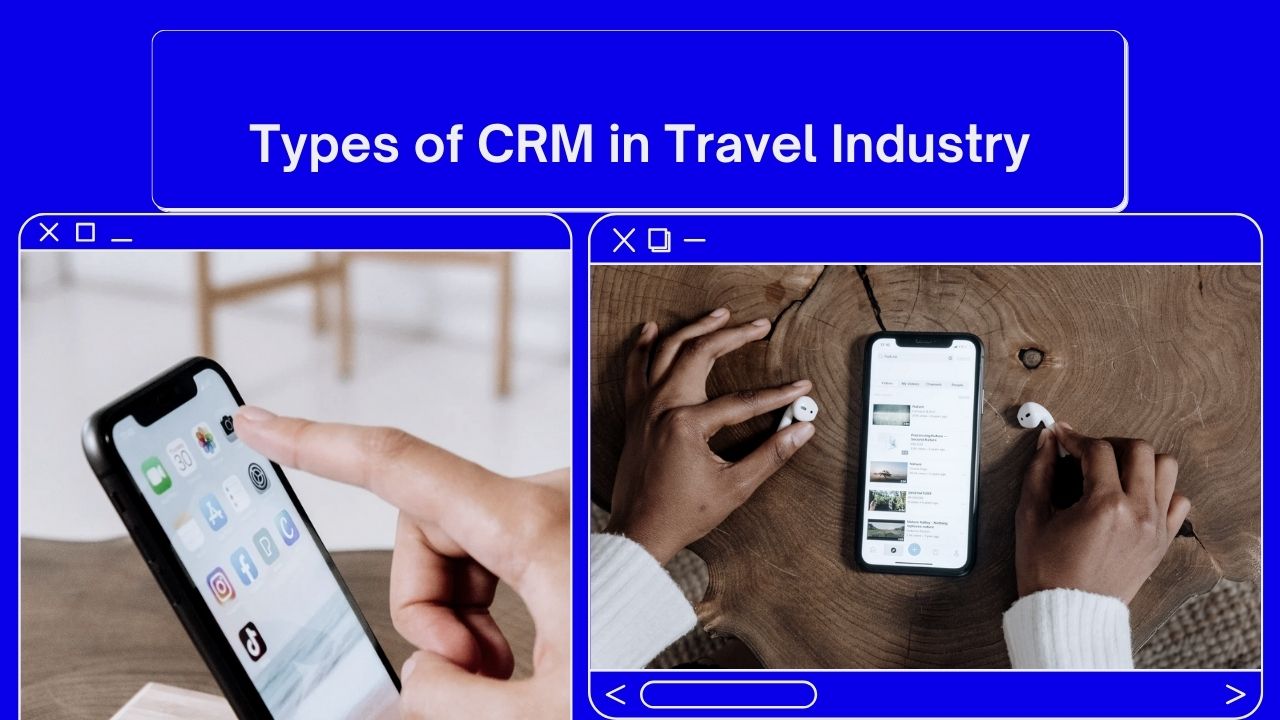Explore the essential types of CRM solutions in the travel industry. Learn how these systems can improve customer engagement and operational efficiency.

Types of CRM in Travel Industry
The CRM systems can be of types ranging from meeting specific needs and enriching customer interactions. This type of CRM varies with their functions, deployment methods, and specific use cases. There are several primary types of CRM systems used in the travel industry, which include:
1. Operational CRM
Operational CRM automates and streamlines the business processes involving customer interactions. In the tourism industry, operational CRM would be majorly about managing bookings, reservations, customer service, and all transactional activities. It deals with customers' details and streamlines routine work such as handling complaints and feedback queries from customers.
Feature:
Booking and Reservation Management: It automatically manages flight bookings, hotel room bookings, tour packages bookings, or even car rental booking.
Customer Service Automation: It governs the customer service interactions through multiple channels of connectivity like a phone, e-mail, and live chat.
Sales Force Automation: Helps travel agents manage their leads, follow up on the prospects, and close deals in an efficient way.
For instance, in an operational CRM scenario, it will automatically send confirmations and reminders on booking and itinerary details to customers so that a stress-free traveling experience is achieved.
2. Analytical CRM
Analytical CRM collects and analyzes information about their customers to make an estimate in front of travel firm companies about customers' behavior, preferences, and trends. This kind of CRM will help them decide on data proof and then they will market their service product according to customer insight.
Features:
Customer Segmentation: It gathers data about the travelers and by analyzing it helps the company to segment the vacationers into groups based on their preferences, behavior, or demography.
Trend Analysis: It will analyze the trend of customers' preference, for instance, which is the tourist destination most liked by the customers or when they like to travel.
Predictive Analytics: This one will predict travel trends and customer expectations in the future along with marketing opportunities.
Application: Analytical CRM of a traveling company may determine that some customers preferred luxury travels; it would therefore go ahead to design and prepare targeted marketing campaigns providing exclusive packages.
3. Collaborative CRM
Collaborative CRM ensures that communication and coordination are maintained smoothly both at the internal departments such as sales, marketing, and customer service and with the external ones such as airlines, hotels, travel agencies, etc. This kind of CRM ensures proper engagement of customers at all touch points and various teams get access to information related to the same customer.
Features:
Shared Customer Data: The latest updated customer profile and history would be available to everyone.
Omnichannel Communication: All teams could reach out to the customer through the various channels available for them: Social Media, Email, Phone, etc. It will make it easy to respond suitably to the customer using this feature.
Partner Relationship Management (PRM): This would support messaging with external business partners like airlines, hotels, etc., whom the customers are interacting with so the customer journey is as smooth as possible.
For example, with an integration of CRM, a travel agent may collaborate with various hotel partners offering special discounted packages to a frequent traveler.
4. Strategic CRM
It is a lifetime relationship with any organization and its customers. In travel, it would refer to relating strategies to hold more customers who will be loyal to the organization. This may include customized offers, loyalty programs, and developing long-term relationships with clients.
Features:
Loyalty Programme Management: This facility follows the loyalty of the customer, their accrued reward points, and special offers for repeat guests.
Customer lifetime value: It identifies the most crucial customers and then tries to reach them with some extra offers and personalized services.
Relationship building: It follows a long-run strategy wherein by personal communication and customized experience to the customer, loyalty of the customer is maintained.
An airline uses strategic CRM in the frequent flier program, wherein exclusive benefits are only for loyal customers; they alone are entitled to become high category holders.
5. Social CRM (SCRM)
Social CRM is the integration of social media with the traditional CRM applications to reach out to the customers on Facebook, Instagram, and Twitter. For a travel company, social visibility is also important since the brand is communicating in real-time with the traveler.
Features:
Social Media Monitoring: Monitoring of customer interaction, comments, and response on the social media sites.
Engagement Tools: The ability to engage with customers through answering questions, complaint resolution, and running promotions on social media.
Social Data Integration: Gathering data about social media activity to create customer profiles, enhance marketing plans.
For example: Travel companies would leverage the application of social CRM once there are postings from customers regarding trip reviews or inquiries on a specific package posted in social media.
6. Campaign Management CRM
Campaign Management CRM is designed for the management of campaign planning, execution, and analysis of their execution. It is very helpful in the travel industry in terms of managing promotional campaigns in holiday packages, discounts, or seasonal offers.
Features
Email and SMS Campaigns: With an email and SMS campaign, the system automatically sends targeted e-mails and messages to customers according to their preferences.
Campaign Segmentation: It makes it possible for travel organizations to segmentation targets using information like booking history, preference, besides demographic details.
Performance tracking: It is used to track the performance of the marketing campaign by following open rates, click-through rates, and conversion.
7. Mobile CRM
Mobile CRM suits an organization that would want to manage customer relationships on the move. When responses and updates are meant to occur on a real-time basis, mobile CRM becomes crucial for speedy access to client data and booking and communication channels on a mobile device.
Features:
Instant notification of bookings cancellations and inquiries made by clients through the mobile application.
Mobile Marketing: Facilitates the business to forward offers or flight updates or travel suggestions directly on to the mobiles of customers.
Mobile Agent Access: This will offer accessibility to the customer's data, management of the bookings of customers, and assistance while traveling.
Example: A mobile CRM can forward customers flight status or travel offers in real time on a special app on their mobile phones.
A travel agency would, for example, use CRM Campaign Management to send holiday packages tailored to different customer types. For this scenario, these could be family travelers or adventure seekers.
8. Cloud-Based CRM
Cloud-based CRM solutions enabled by cloud means that customers' data can be accessed and relationship managed from any location with an internet connection. This will be excellent for travel companies, which need to manage global operations, provide considerable collaboration with partners, and provide integrative service to customers worldwide.
Features:
Global Accessibility: Enables the travel businesses to manage client relations from any location, which is the best for firms having branch offices in varied locations or distanced teams.
Scalability: Cloud-based CRM is scalable with growth as it doesn't need storage and features; therefore, this is highly flexible.
Cost-Effective: Saves money from extremely expensive on-premise infrastructure for small or medium-sized travel businesses.
For example: A global travel agency uses cloud-based CRM in order to track, manage, and process booking, payments, and communications with clients across various regions and time zones.
9. Custom CRM
Custom CRM is specifically built to meet the specific needs of a travel company. Most travel organizations would be well-serviced with an off-the-shelf product, but when there is an exact business that calls for very tailor-made systems to satisfy certain operational needs, only a few can.
Features:
Customized Functionality: A custom-made system of the CRM, which will include those features that are most appropriate for the specific needs of the travel company.
Integration with Third Party System: The integrations of travel management systems with other systems such as GDS support real time inventory and booking updates.
Accurate Tailor-made Customer Profiling: A dedicated CRM system is capable enough to capture even the minute details related to traveling, from the very minute details including passport details, visa requirements, etc., special dietary preferences, etc.
For example: A luxury tourism company needs, therefore, a customized variant of CRM with its ultra-HNW clients; the former is supposed to remember every type of information based on their traveling tastes and particular demands.
Conclusion
The travel industry is so dynamic that it needs immense management at every step in customer relationships, services improvement, and for overall business efficiency. The operational one deals with bookings, social CRM enables engagement on social platforms, and analytical CRM provides insights through data analysis. So, this type of CRM can offer personalized services to the clients, keep loyal customers, and lead a travel company ahead in a very competitive market.
Also Read:- How to Open A Travel Agency In India

 Start your Travel Business with Our 7 Day Free Trial Website!
Start your Travel Business with Our 7 Day Free Trial Website!